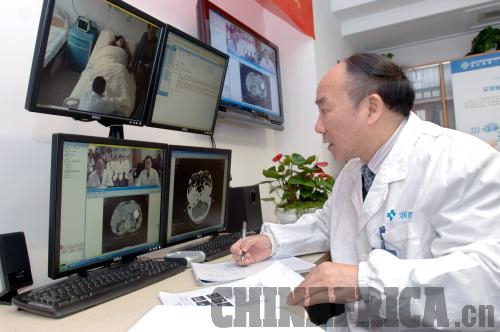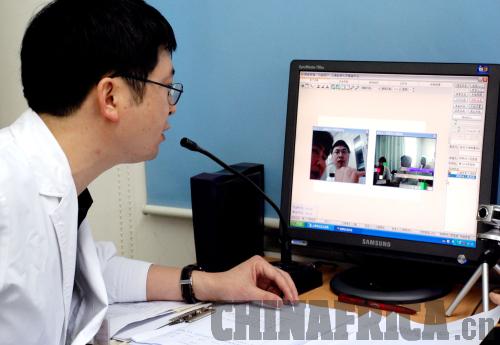|
|

|
|
Doctors provide medical care over vast distance using modern technology |
As Africa and China continue to celebrate the the jubilee cooperation in health, one South African company, called Telemedicine Africa, is providing basic healthcare solutions to millions of Africans – remotely.
Telemedicine technology allows doctors to diagnose patients using telecommunications, like webcams and other Internet platforms, when they are separated by distance. Using these advances, Telemedicine Africa, in partnership with China-based telemedicine giant SUNPA, has been able to provide interactive health care to a broad swath of the South African populace.
Telemedicine was founded in 2008, and operates as a private company with a bare bones staff of 10 permanent employees. It does its noble work under the leadership of Dr. Lynette Molefi, a South African medical doctor and the company's managing director. She has been one of the few pioneers of telemedicine in South Africa, and the entire continent, with representation at various levels of government and non-governmental organizations.
Born to lead
Born in the suburb of Soweto, outside Johannesburg, Molefi grew up in Lesotho, where she completed her early education. She earned a Bachelor of Science degree at Roma University in Lesotho and went on to study at the Medical University of South Africa (MEDUNSA), where she qualified as a medical doctor.
Molefi's interest in telemedicine started when she attended a telecoms conference in 1998. After completing a telemedicine course in the U.S., she moved into Telemedicine research for eight years, hoping to gain an edge in an industry that was then still in its infancy. She went on to serve as director for Telemedicine Research at the Medical Research Council (MRC) of South Africa for seven years.
The telemedicine unit was established as a joint project of the South African Department of Health and the MRC. Since its founding, the unit has gone a long way toward closing the gap in access to health services, which has roots in the country's apartheid past. With spending on health care accounting for a significant portion of rural budgets, telemedicine helps reduce these costs, as people in remote areas don't have to travel out of the community to see a doctor.
 |
|
Doctors provide medical care over vast distance using modern technology |
A medical miracle
Molefi said the business model for Telemedicine Africa is two-fold. "You have a scarcity of health care professionals in the rural areas and therefore we can offer medical services from a distance. This can be solely in the public sector or a combination of the public-private partnership with healthcare providers in the private sector. We provide a [medical] service to the underserved rural population who would otherwise have to travel long distances to get specialist care. One of the dermatology projects we did with the University of Cape Town Dermatology Department showed that 85 percent of the [patient's] images [sent via telecommunications] were adequate for diagnosis and we saved 75 percent of unnecessary [medical] referrals," she said.
Telemedicine Africa operates by first doing a medical needs assessment for an area and proposing projects that will address the specific needs there. They then implement suitable medical solutions and provide training and support, via various business models. Some of these are led by the government, with Telemedicine Africa supplying the technical equipment and training. The company then manages and operates the project. Another model is supplying a platform for telemedicine consultations and providing the doctors and specialists to consult with the referring sites. Payments for these services vary. The client can pay on behalf of their employees, the government can pay on behalf of patients or the patients themselves can pay if it is a private clinic that is electronically connected.
Of course, this being Africa, the work is not without its challenges. "[Internet] Connectivity is a challenge on the continent and it is also very costly. The 'change management' aspect is also a major challenge as we have to change doctors and patients' mindsets. The funding for the inception phase of these projects has also been a major hassle as most governments [in Africa] do not have eHealth policies and such strategies therefore are not budgeted for," said Molefi.
But there are also positive results coming from telemedicine. "We have implemented one of the only functional telemedicine projects in South Africa in the Limpopo Province. We are now implementing a virtual hospital concept in partnership with the Industrial Development Corp. (IDC) and Dimension Data. This center will be able to offer medical services, over a distance, to any site in the world, as long as it can be connected to our virtual hospital," said Molefi, who won an award for Best Technology for Women in Business in 2011. For her efforts she has also been nominated to be on the WHO global advisory eHealth committee.
Chinese connection
Telemedicine Africa has signed an exclusive distribution agreement with China-based SUNPA for the supply of all its telemedicine products in Africa, as well as technology transfer. SUNPA, established in 1998 and based in China's Yunnan Province, has set up one of the biggest telemedicine networks in the world centered around Beijing, Shanghai, Guangzhou and Kunming. The networks cover more than 1,000 hospitals at different levels throughout China, using the services of more than 6,500 well-known medical experts and about 76,000 doctors to provide quality medical services to a population of 520 million. SUNPA is now an international group with total assets of $650 million.
"We have been working with SUNPA on research projects since 2003, as part of the South Africa-China science and technology bilateral agreement on technology transfer," said Molefi. "SUNPA has signed an exclusive distribution agreement with Telemedicine Africa for the supply of all SUNPA telemedicine products in Africa. We have a solid partnership based on a solid research foundation and have developed a very good relationship with our Chinese partners based on trust and professionalism. The language barrier is still a challenge but we will overcome that."
Telemedicine projects on the African continent are still in their pilot phases, but Molefi said that they can attest to the fact that their project is fully functional. "SUNPA is the largest telemedicine company in the world based on the number of telemedicine products they have developed and the number of sites. Our China-Africa relationship is based on mutual respect and we have a lot in common in our health systems. We therefore can share scarce resources," she said.
Molefi is a pioneer in every sense of the word, with a profound belief that business must do good to do well. And, in partnership with China, this is exactly what she and her team are achieving in providing medical care over vast distances for those in need. CA
(Reporting from South Africa)
|